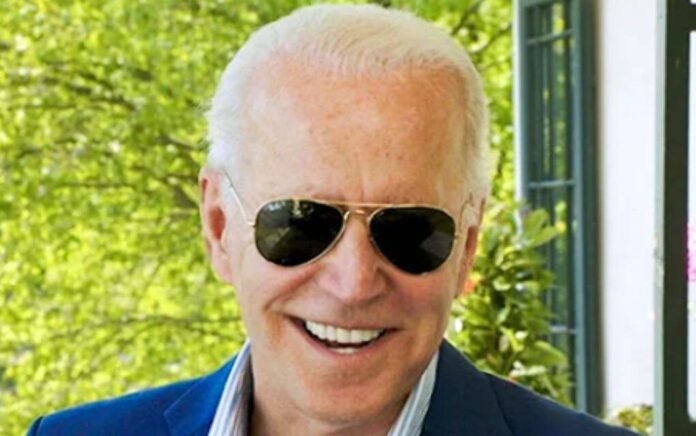
The Biden administration is suffering. And the American people do not trust the President at all.
But now, a new poll has uncovered the terrifying secret that Joe Biden is trying to hide.
A recent Rasmussen poll has unveiled that a significant majority of voters not only support President Joe Biden’s decision to step down from seeking a second term but also believe he should resign from office immediately.
The survey, conducted between July 22-24, 2024, questioned 1,074 likely voters, revealing critical insights into public opinion regarding the current administration.
The poll findings are stark: 76 percent of likely voters approve of Biden’s decision not to run for re-election, with 53 percent expressing strong approval.
Conversely, only 18 percent disapprove of this decision. More notably, 52 percent of Americans believe that Biden should not wait to complete his term and should resign immediately.
The survey further asked participants how they believe Biden will be remembered in the annals of American history. The most common response, chosen by 29 percent, was “the worst president ever,” while another 21 percent categorized him as a “bad president.” These numbers underscore a deep-seated dissatisfaction with Biden’s tenure among the American electorate.
Following Biden’s announcement, prominent political figures did not hesitate to voice their concerns. House Speaker Mike Johnson stated, “If Joe Biden is not fit to run for President, he is not fit to serve as President. He must resign the office immediately.” This echoes the opinion of many who see Biden’s withdrawal from the 2024 race as an implicit admission of his incapacity to govern.
Republican VP nominee JD Vance was even more forthright, asserting, “Everyone calling on Joe Biden to stop running without also calling on him to resign the presidency is engaged in an absurd level of cynicism. If you can’t run, you can’t serve. He should resign now.”
Senator Josh Hawley also chimed in, stating, “The American people deserve a leader who can fully perform the duties of the office. President Biden’s inability to effectively communicate and lead is evident, and it is time for him to step down.”
Biden’s decision to bow out of the 2024 race came via a public statement on X, followed by an Oval Office address. Despite this significant political move, neither Biden nor the White House has provided a clear reason, leading to widespread speculation about his declining health and poor poll numbers against former President Donald Trump.
These developments hint at a strategic maneuver by the Democratic Party to find a more viable candidate for the upcoming election.
The ramifications of Biden’s potential resignation are multifaceted. Domestically, it raises questions about the stability and direction of current policies. Internationally, it projects uncertainty at a time when global tensions are high.
The president’s apparent cognitive decline, witnessed by both American citizens and foreign leaders, exacerbates these concerns.
The president’s declining health has been a topic of discussion for some time. During a recent debate, Biden struggled to complete sentences and articulate his policy proposals, further fueling concerns about his capacity to lead.
Many Americans argue that this is not just a bad day for Biden but a consistent pattern that has been observed over the past few years. The implications of a leader unable to sustain attention during critical discussions are far-reaching, affecting both national and international confidence in the administration.
The lack of clear communication from the White House regarding Biden’s health only adds to the speculation and concern. While the administration maintains that Biden is fit to serve, the visual evidence and public perception suggest otherwise. This discrepancy between official statements and public perception undermines trust and confidence in the administration’s transparency.
Biden’s decision to not seek re-election and the subsequent calls for his resignation have sparked a flurry of activity within the Democratic Party. Potential candidates are jockeying for position, preparing to step into the void that Biden’s departure would create. However, this internal maneuvering has its own set of complications.
Vice President Kamala Harris, the presumptive nominee if Biden resigns, faces skepticism within her own party about her electability. This hesitation further complicates the Democratic Party’s strategy moving forward.
Additionally, the party must contend with the optics of pushing out a sitting president. While some Democrats argue that Biden stepping down is in the best interest of the country, others fear that it may be seen as a sign of weakness and instability. The party’s ability to manage this transition smoothly will be critical in maintaining voter confidence and unity.
The international community is closely watching the developments in the United States. Allies and adversaries alike are assessing the implications of a potential transition in leadership.
With global tensions high, particularly in regions such as Ukraine and the Middle East, the perception of American stability is crucial. A leadership change could either reassure allies or embolden adversaries, depending on how it is handled.
In Europe, where political shifts are already occurring, the uncertainty in American leadership adds another layer of complexity.
The United States’ role in global alliances and its ability to project power and influence is under scrutiny. A smooth transition of power, if handled correctly, could stabilize the situation. Conversely, a chaotic transition could lead to further instability and uncertainty.
The Rasmussen poll’s revelations are a clear indication that public confidence in President Biden’s ability to lead has significantly eroded. As the debate over his immediate resignation intensifies, it becomes evident that the American people are seeking decisive action to address what they perceive as a leadership crisis. Whether Biden will heed these calls remains to be seen, but the pressure from both the electorate and political figures is undeniably mounting.
The coming months will be critical for the Biden administration and the Democratic Party. How they navigate this period of uncertainty will have lasting implications for the country’s political landscape and its standing on the global stage.
The American people are watching closely, and their voices, as reflected in the recent Rasmussen poll, are calling for change.
Stay tuned to The Federalist Wire for updates on this developing story.


















